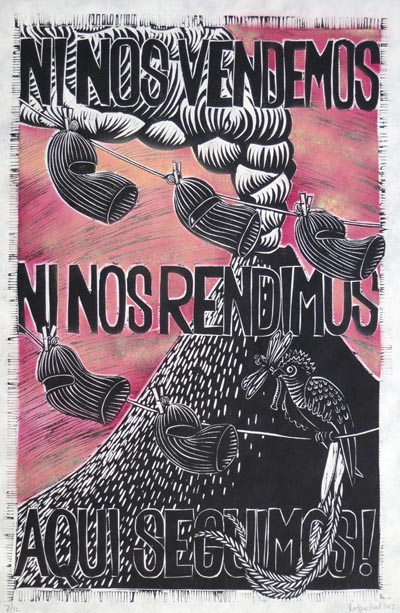
June 13, 2013, by Zoë Goodwin
Picturing Politics: the Zapatista struggle
Picturing Politics, a blog produced by the School of Politics and International Relations at the University of Nottingham is host to a series of audio and video clips featuring academics commenting on the political significance of a diverse range of images.
The fourth post features Dr Adam Morton who examines the struggle of the Zapatistas, a revolutionary leftist group based in Chiapas, the southernmost state of Mexico, as represented in the block print ‘Aqui Seguimos’ by Roger Peet.
The print in English reads ‘We don’t sell out, we don’t surrender, we stay’. During this clip, Dr Morton explains how Roger Peet’s masks hung on a clothes line represent the Zapatista communities.
The clip starts with a description of the origins of the Zapatista communities. Dr Morton explains that the Zapatista struggle formally announced itself to the public in 1994 in Mexico when it stormed several towns in Chiapas and declared their demands for work, land, health, education, independence, freedom, justice and peace.
He then goes on to explain why the Zapatista communities’ rebellion and strategy intentionally coincided with the implementation of the North American free trade agreement (NAFTA) which came into force on January 1st 1994 – NAFTA was a crucial catalyst for the extension of neoliberal restructuring that included fundamental reform of the agrarian sector.
Since then five key accomplishments have marked the Zapatista struggle:
- The activation of national & international civil society
- The promotion of indigenous rights
- The appeal to collective class interests beyond ethnicity
- The campaign for wider democratisation from below
- Constant innovation through new special forms of governance within the communities of Chiapas.
And then in December 2012, the Zapatista marked the resurgence of their social struggle as 40,000 members silently marched across Chiapas.
To conclude this clip, Dr Morton states the importance of this movement’s attempts at another way of doing politics in Mexico and the wider world.
Listen to the full audio clip here.
No comments yet, fill out a comment to be the first

Leave a Reply